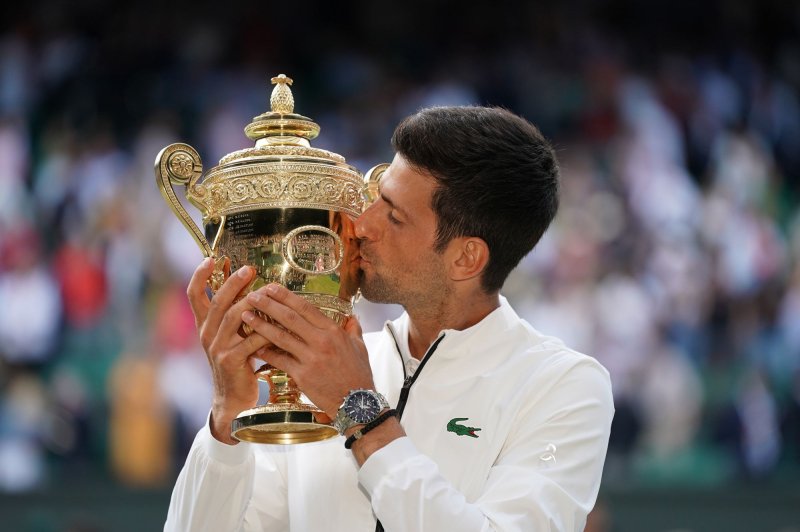Serbian Novak Djokovic kisses the winners trophy at Wimbledon on Sunday. Photo by Hugo Philpott/UPI |
License Photo
BERKSHIRE, England, July 17 (UPI) -- While the French were celebrating Bastille Day, July 14th was a remarkable day for Great Britain. Both the Wimbledon tennis championship and the World Cricket finals were being played in London. In America, this would amount to the World Series and Super Bowl being held on the same day in New York or Washington.
At Wimbledon, the world series of tennis, in a titanic five-hour struggle, Novak Djokovic defeated the 38-year-old Roger Federer in a fifth-set, 15-13, sudden death game. At Lords Cricket pitch, England and New Zealand battled to a 241-all tie. Ties in cricket were unprecedented. And England scored the tying run on the last ball or pitch of the match.
Cricket matches are won, lost or draw if time runs out. Ties never happen. A sudden death "super over" of six balls (or pitches) ended with England winning 15-14 -- a spectacular finish to the match of the decade or more.
At the same time, Queen Elizabeth II paid an informal visit to another cricket match. Held on her private park adjacent to Windsor Castle, the match was between her royal household, playing an every-other-year game against an Australian cricket club. The Queen arrived without fanfare or ceremony in a black Land Rover smartly dressed in a lime green outfit and hat.
The Queen mingled with a crowd of about 300 very respectful and admiring on watchers who had been carefully screened; had photos taken with both teams; and sat in a tent to watch the end of the match. One could imagine an American president attending the same venue with casts of hundreds of Secret Service agents, the standard presidential entourage and the usual press corps amid cat calls and boos.
These events suggest that the "great" is not yet missing from Great Britain. If true, these undercurrents may help avoid the horrible outcome many predict will accompany Brexit. Much is expected of Boris Johnson, the aspiring prime minister. Some hope that Johnson will prove to be Churchillian in steering the nation through this crisis. Others argue that except for 1940-45 when Churchill was a brilliant wartime leader, the 50 years of his public life ranged between disaster and catastrophe.
As first lord of the admiralty, Churchill ordered the assault on Gallipoli in the Dardanelles. As head of the commonwealth and the exchequer, his policies led to acute failures. Johnson might likewise succumb to a similar record.
In some ways, Johnson is more eccentric version of a smaller Donald Trump. Not nearly as portly, Johnson still seems unkempt. Unlike the president with his well-tended yellow coiffure, Johnson's blonde hair has never seen a comb that works. And his tailors must despair that despite their best efforts, Johnson always looks rumpled.
Johnson's work is surely Sisyphean. Britain will leave the European Union on Oct. 31. Barring a sudden reversal, leaving will be with or without an agreement. A "hard" landing Brexit would seem to fit the Churchillian oscillation between disaster and catastrophe.
But the hard-line Brexiters believe that once free of the strangling rules and regulations of the EU, Britain's economic "animal spirits" will be released. Over time, whatever damage done by Brexit will be repaired and replaced by a revitalized Britain. However, given that the Conservative Party is torn apart over Brexit among hard-line leavers and remainers and moderates of both persuasions, Johnson will have to bring his members together -- a daunting and some think impossible task.
One advantage Britain has is that aside from Brexit and a few other issues, its politics are not as partisan and divisive as America's. Few in the United Kingdom are taking to the barriers over a woman's right to choose, guns, gays, the role of religion and climate change. The incandescent and pernicious atmosphere in the new world is not fully replicated in the United Kingdom.
That good news however and the undercurrent of a coherent society may not be sufficient if the Brexit worriers are correct. By the end of this month, Britain will have a new prime minister. He -- and the choices are Johnson or Foreign Secretary Jeremy Hunt -- must form a government. If there is an election, almost certainly that government, as the current one, will be a coalition. Whether any prime minister can effectively work with a coalition absent a crisis such as World War II that put Winston Churchill in charge is unanswerable.
For over a century and a half, the sun never set on the British Empire. The burning question today is if Brexit will cause the sun to set on Great Britain.
Harlan Ullman is a senior adviser at the Atlantic Council. His latest book is "Anatomy of Failure: Why America Has Lost Every War It Starts." Follow him @harlankullman.















